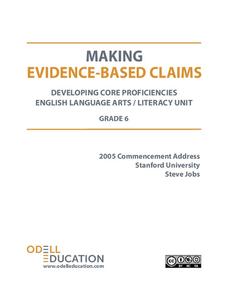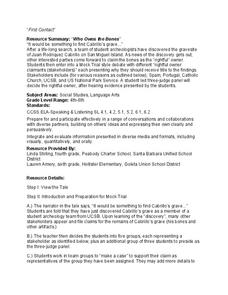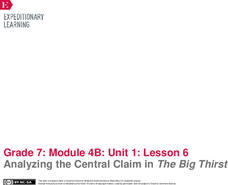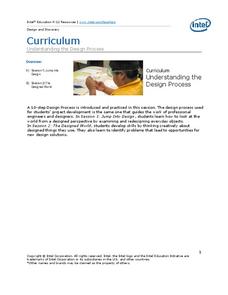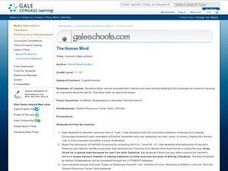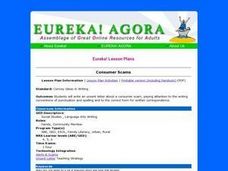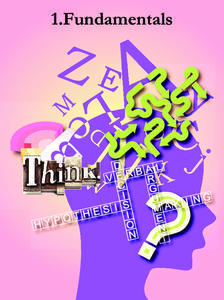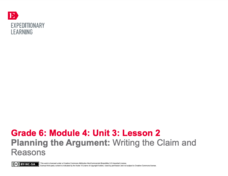Odell Education
Making Evidence-Based Claims: Grade 9
Sorry, Charlie. Scholars take a close look at Apology by Plato. Activities analyzing the text help pupils understand, make, organize, and write about claims. Learners work in groups, complete claim tools, and evaluate thinking by filling...
Odell Education
Making Evidence-Based Claims: Grade 6
In order to make evidence-based claims, one must be able to draw explicit information from text. From here, learners take that information, analyze the text to develop a deeper understanding, and connect with the information in order to...
EngageNY
Reading Closely: Introducing Chávez’s Commonwealth Club Address and Considering the Plight of the Farmworker
How can a persuasive speech help inspire social change? Scholars read along as they listen to the first half of César Chávez's 1984 speech, "Commonwealth Club Address." Next, pupils use graphic organizers to analyze one of Chávez's...
Channel Islands Film
Who Owns the Bones
A study of the history of the Channel Islands, located off the coast of southern California, continues as class members conduct a mock trial to determine which group of stakeholders should have the right to claim the remains of Juan...
C3 Teachers
2020 Protests: Is There Anything New about the 2020 Protests?
Are marches and protests an effective form of resistance? That is the question high schoolers seek to answer in this inquiry lesson as they compare the 2020 protests to historical ones. Researchers use Venn Diagrams to compare images...
Curated OER
Introduce Vocabulary: Tar Beach (Ringgold)
Anyplace can become a beach! Budding readers explore Faith Ringgold's world of imagination in her book Tar Beach, which can be found on YouTube if you don't have it. What words will budding readers learn? They focus on the following...
Howard Hughes Medical Institute
Human Impacts on Biodiversity
Have you always wanted to take your science class on an amazing field trip they will never forget? Now you can! Observe the wildlife in an African savanna through trail cameras with a five-part data analysis activity. Learners analyze...
EngageNY
Analyzing the Central Claim in The Big Thirst
Quench the class's thirst for knowledge while building analytical skills. Scholars listen as the teacher reads excerpt from the book The Big Thirst. They then complete a close read and answer text-dependent questions from pages one...
Tumblehome
Resisting Scientific Misinformation
How do scholars determine if a scientific claim is true? Learners investigate scientific misinformation by watching video clips and reading false advertising claims. They engage in discussion in both class and small group settings to...
K20 LEARN
Arguing With Evidence: Deconstructing Arguments Part 1
In the first lesson in a two-part series, high schoolers pick a social issue important to them and examine an article about the topic, the arguments and evidence used to support the writer's stance, and craft two counter-arguments to the...
K20 LEARN
Argument Is Everywhere: Introduction to Argument
C.E.R = Claim + Evidence + Reasoning. That's the framework behind building a solid piece of argument writing. Introduce young writers to this format with an engaging lesson that uses YouTube videos and a PowerPoint to illustrate the...
Practical Money Skills
Protecting Your Money
How can you tell if a commercial or salesperson is being misleading? Encourage your learners to protect themselves and their money with a lesson about consumer rights. They review laws that keep consumers safe from faulty claims and...
CCSS Math Activities
Smarter Balanced Sample Items: 7th Grade Math – Target H
Not one but two box plots. How will your pupils fare? Assess their understanding of box plots by having them compare two populations. The eighth of nine installments in the Gr. 7 Claim 1 Item Slide Shows series, the resource has them...
CCSS Math Activities
Smarter Balanced Sample Items: 6th Grade Math – Target G
Making money and saving money turn into high interest topics for sixth graders. Grade 6 Claim 1 Item Slide Shows use these topics in a presentation with math practice problems. The questions require applying knowledge of algebraic...
Curated OER
An Activity to Introduce Critical Thinking
Young scholars discover how easy it is to accept oulandish claims by witnessing a fellow student show that they have a form of ESP but is secretly working with the teacher. This demonstrations uses skepticism as a starting point for...
Intel
Understanding the Design Process
Can you build a better mousetrap? Broken into two sessions, this plan introduces learners to the design process. The first session has pupils look at the world through a design perspective by redesigning everyday objects. In the second...
Texas Education Agency (TEA)
Distinguishing Between Inductive and Deductive Reasoning (English III Reading)
Is Sherlock Holmes an inductivist or a deductivist? Users of this interactive to distinguish between inductive and deductive reasoning. They consider in various situations whether it is better to list evidence and then introduce a claim...
EngageNY
Grade 9 ELA Module 3, Unit 3, Lesson 1
The opening exercise in this instructional unit introduces class members to the writing process they will follow to craft an informative, expository research paper that addresses their research question. To begin, writers are asked to...
Curated OER
Nonfiction Genre Mini-Unit: Persuasive Writing
Should primary graders have their own computers? Should animals be kept in captivity? Young writers learn how to develop and support a claim in this short unit on persuasive writing.
Curated OER
Persuasive/Argumentative Essay vs. Opinion writing
Reinforce persuasive and argumentative writing skills with this instructional activity, which utilizes SchoolNet News Network's website/SNN Monthly magazine. Young writers review journalism writing styles that help them explain that...
Curated OER
Hamlet's State of Mind
Analyze various excerpts from Hamlet and read articles to develop an argument about his sanity. Middle and high schoolers write an argument essay defending whether or not they believe Hamlet is insane. You could modify this assignment...
Curated OER
Convey Ideas in Writing
Use the platforms of the 2004 presidential candidates to bring persuasive writing to your class. Young voters identify the three issues most important to them in the election and research the issues and candidates' positions. They write...
Education Bureau of Hong Kong
Fundamentals
"Fundamentals," the first lesson in a series of eight, introduces the basic concepts and strategies covered in a series of resources designed to teach high schoolers critical thinking skills. The worksheets and activities in this first...
EngageNY
Planning the Argument: Writing the Claim and Reasons
Step up! Using the resource, scholars discover the six steps to writing an effective position paper. Next, they work on a graphic organizer to begin planning their argument-based essays.



